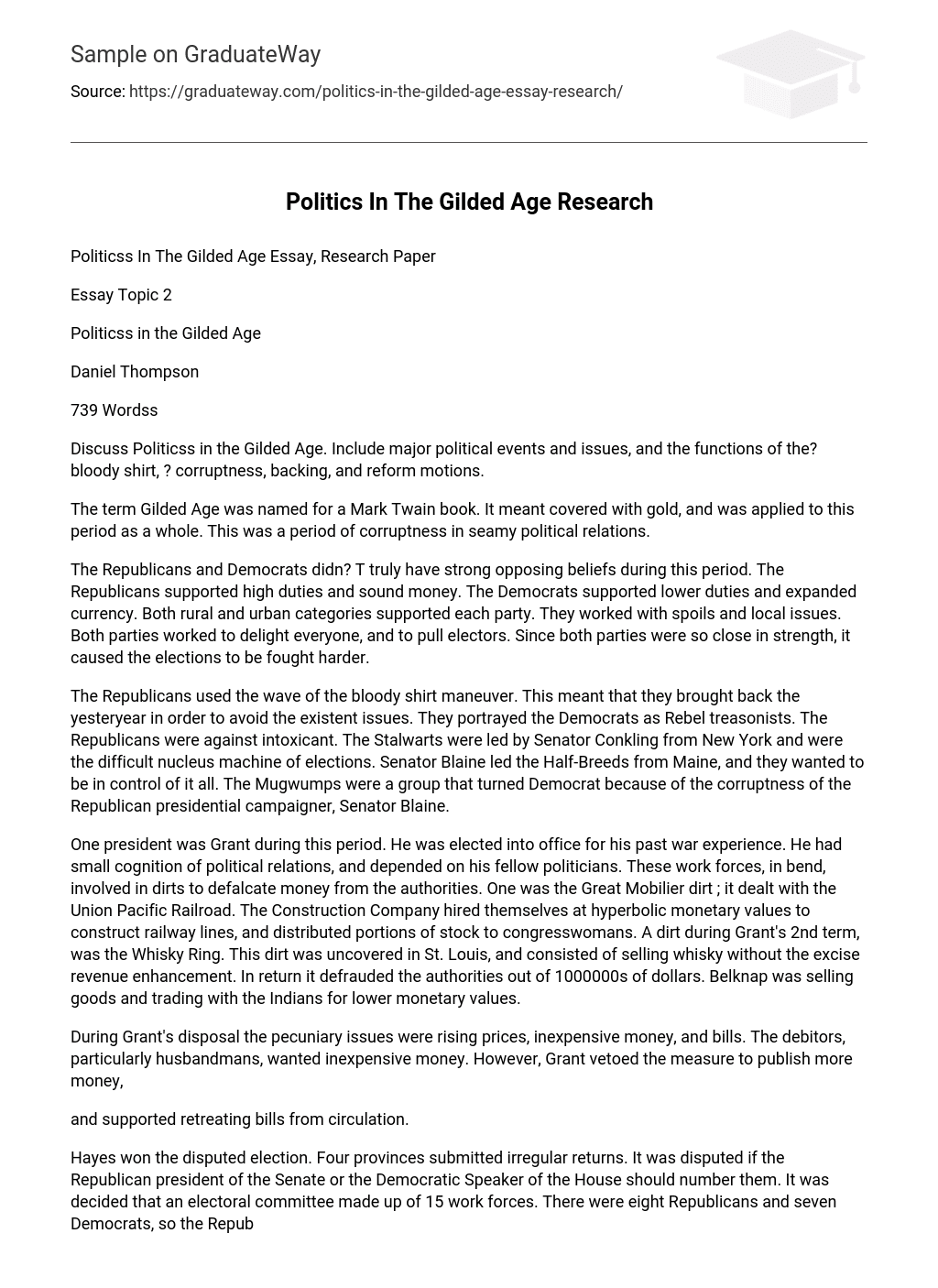Politicss In The Gilded Age Essay, Research Paper
Essay Topic 2
Politicss in the Gilded Age
Daniel Thompson
739 Wordss
Discuss Politicss in the Gilded Age. Include major political events and issues, and the functions of the? bloody shirt, ? corruptness, backing, and reform motions.
The term Gilded Age was named for a Mark Twain book. It meant covered with gold, and was applied to this period as a whole. This was a period of corruptness in seamy political relations.
The Republicans and Democrats didn? T truly have strong opposing beliefs during this period. The Republicans supported high duties and sound money. The Democrats supported lower duties and expanded currency. Both rural and urban categories supported each party. They worked with spoils and local issues. Both parties worked to delight everyone, and to pull electors. Since both parties were so close in strength, it caused the elections to be fought harder.
The Republicans used the wave of the bloody shirt maneuver. This meant that they brought back the yesteryear in order to avoid the existent issues. They portrayed the Democrats as Rebel treasonists. The Republicans were against intoxicant. The Stalwarts were led by Senator Conkling from New York and were the difficult nucleus machine of elections. Senator Blaine led the Half-Breeds from Maine, and they wanted to be in control of it all. The Mugwumps were a group that turned Democrat because of the corruptness of the Republican presidential campaigner, Senator Blaine.
One president was Grant during this period. He was elected into office for his past war experience. He had small cognition of political relations, and depended on his fellow politicians. These work forces, in bend, involved in dirts to defalcate money from the authorities. One was the Great Mobilier dirt ; it dealt with the Union Pacific Railroad. The Construction Company hired themselves at hyperbolic monetary values to construct railway lines, and distributed portions of stock to congresswomans. A dirt during Grant’s 2nd term, was the Whisky Ring. This dirt was uncovered in St. Louis, and consisted of selling whisky without the excise revenue enhancement. In return it defrauded the authorities out of 1000000s of dollars. Belknap was selling goods and trading with the Indians for lower monetary values.
During Grant’s disposal the pecuniary issues were rising prices, inexpensive money, and bills. The debitors, particularly husbandmans, wanted inexpensive money. However, Grant vetoed the measure to publish more money,
and supported retreating bills from circulation.
Hayes won the disputed election. Four provinces submitted irregular returns. It was disputed if the Republican president of the Senate or the Democratic Speaker of the House should number them. It was decided that an electoral committee made up of 15 work forces. There were eight Republicans and seven Democrats, so the Republicans won. The Democrats would merely accept this with conditions, one of which was to take military personnels from the South.
The following president was a political? unknown? . His name was James Garfield. A disturbed politician shooting him in the dorsum at a railway. This demonstrated the corruptness in the backing system and led to reform.
In the following presidential election the Republicans nominative James Blaine and the Democrats supported Grover Cleveland. Both parties were the same on issues and both agreed on duty and corporate maltreatments, so it came down to personal issues. Cleveland won the election and was the first Democratic President since before the Civil War. His doctrine of authorities was about wholly negative. He believed that the authorities should non back up people. He wanted to reform duty, but Congress postponed it. The Republicans described Cleveland’s duty reform as a free trade policy that would destroy American industries and set Americans out of work.
The Republicans regain the White House with Benjamin Harrison. The final payments for industries were high duties. The downside was increased authorities disbursement. The Sherman Silver Purchase Act was passed to assist the Ag bush leagues and economic system. During President Cleveland’s reelection, the Sherman Silver Purchase Act drained the exchequers. Paper notes were traded for gold, so reissued, and the procedure would be repeated. The worst depression of that century occurred during Cleveland’s 2nd term. Cleveland tried to revoke the Sherman Silver Purchase Act, but it was excessively late. Gold was about depleted, so he borrowed $ 62 million in gold from J.P. Morgan. The Wilson-Gorman Act reduced duty somewhat, and had a proviso that the Populist favored. It was a 2 % income revenue enhancement on incomes over $ 4000 a twelvemonth. In all Cleveland was unable to cover with the economic crises in his 2nd term.
There was excessively much corruptness during this period. Honest politicians and business communities might hold prevented the depression. The large concerns were truly in charge. The quality of Presidents played a major function in the ruin of this period.
33b





